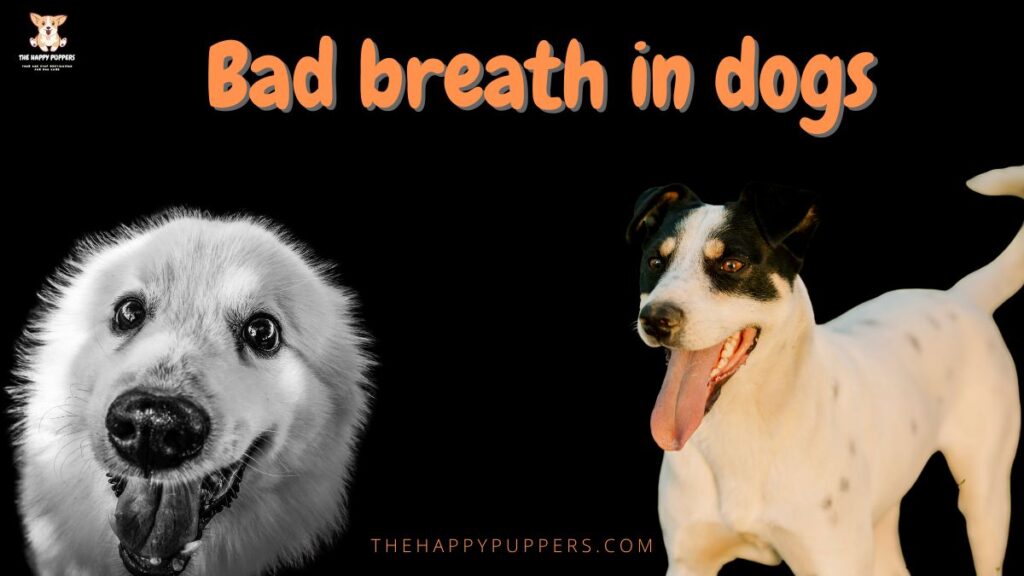Dogs are one of the most wonderful creatures on this planet. Everything they do is utterly adorable. However, there is one thing that dog guardians cannot stand. It is bad breath in dogs. Puppy and doggy kisses are highly appreciated. However bad breath in dogs instantly makes guardians regret asking for affection.
Unfortunately, a case of bad breath in dogs, or halitosis as it is referred to in medical terms can be much more than just bad breath. Dogs cannot openly tell you what’s bothering them. Thus, even the smallest signs of infection should not be ignored. Before you think of adding a dog breath mint to your pup’s diet, understand the underlying causes of dog bad breath and the steps you need to take as a responsible dog guardian.

If you wish to know more about dog care, psychology, training, and everything that pertains to the well-being of your dog, subscribe to The Happy Puppers. This blog is your one-stop destination for everything dog-related. If you like watching videos, subscribe to the YouTube channel of The Happy Puppers, Shruti, and Delta. Remember to ring the notification bell and set it to ALL so that YouTube notifies you every time a new video is released.
Topics covered in this blog post
Causes of bad breath in dogs
In most instances, I have noticed, dog guardians do not give much importance to dogs bad breath. If the dog has bad breath, they just attribute it to dog breath and leave it at that. However, as I mentioned before, bad breath in dogs can be a sign of many underlying health conditions in your dog.
Periodontal disease
One of the most common and frequent causes of bad breath in dogs is the presence of periodontal disease and bad oral hygrine. Just like humans, the constant build-up of tartar and plaque leads to the formation of biofilms in the oral cavity of the dog. The bacteria in biofilms lead to the production of bad breath, they can also cause secondary infections. Thus, bad breath in dogs must not be ignored.
If oral hygiene is not paid proper attention by the dog guardians, it can eventually lead to periodontal disease. In this disease, the tartan and plaque build-up pushes the gums away from the teeth. This exposes new areas for the development of biofilms. Eventually, this condition leads to the formation of cavities, tissue destruction, infection, tooth loss, and pus formation.
Unbalanced gut microbiome
Microbiome refers to the dynamic community of fungi, viruses, bacteria, and other microorganisms that are a part of your dog’s digestive system. Usually, the presence of these microbes does not lead to an infection. However, if there is an imbalance in the microbial population in the gut, it can also lead to foul dog breath. Under such conditions, there is usually an overgrowth of one of the microbial populations. When these bacteria work, they release smelly gases as by-products. These gases get absorbed in the bloodstream of the dog and are eventually exhaled. This leads to bad breath in dogs.
Unpleasant dietary habits
This point may not apply to all dogs, but some dogs can be extremely gross.. like licking butts, drinking from the toilet bowl, etc. Sometimes such habits can be the cause of bad dog breath. In case your dog has a habit of rummaging through trash or loves to get in your decomposing bin, he may have bad dog breath.
Poop eating behavior/Coprophagia can also lead to bad breath in dogs
Another cause behind your dog’s bad breath is your dog engaging in poop-eating behavior. Poop eating on Coprophagia has been covered in one of my previous blog posts. Thus, if you want further details on the same, please click on the link, read the post on coprophagia first, and then proceed to read the rest of this article. In some cases, dogs have been seen snacking on cat poop, cow poop, and in certain instances, their own poop as well. This problem can also indicate that your dog is not getting adequate nutrition in its diet. Thus, find out if your dog is suffering from coprophagia and how you can help as the dog guardian.
Diabetes
In case your dog is displaying sweet or fruity breath, you need to take your dog to the doctor as soon as possible. Signs like sweet and fruity breath indicate the presence of diabetes. Even though diabetes is a pretty serious condition, it can easily be managed by proper regimen drugs. However, to start your pup on the right drugs, you need to meet up with a veterinarian. Your veterinarian may ask you to monitor your dog. for other signs and symptoms of diabetes. Some examples of symptoms to look out for are excessive urination, more drinking, signs of aggressive behavior, etc.
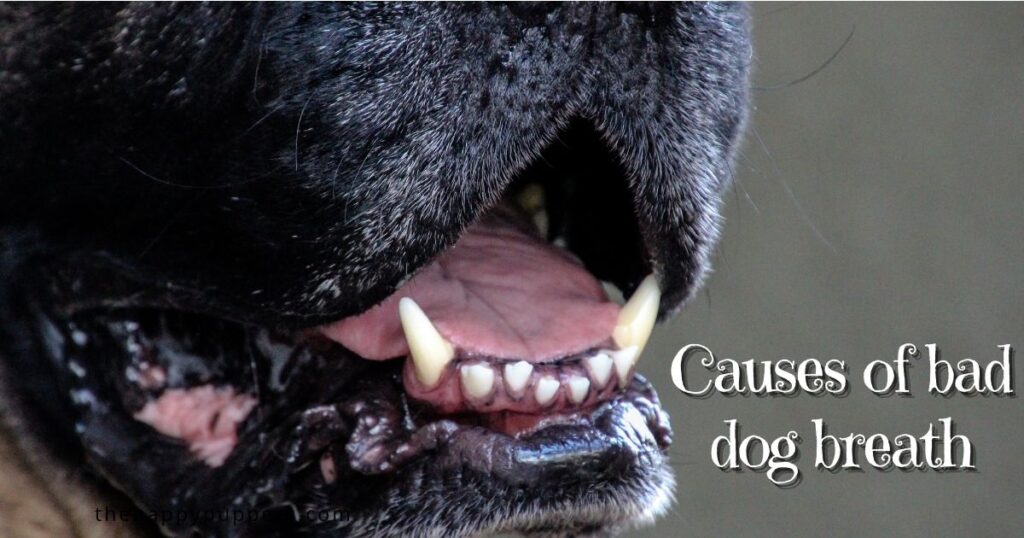
Kidney issues cause bad breath in dogs
Another problem that may lead to bad breath in dogs is kidney disease. In case, your dog’s breath smells like urine, you must take him to the veterinarian without fail, and as soon as possible. Breath smelling like urine doesn’t mean that he drank urine. This only means that your dog is probably suffering from a kidney issue. Kidney issues can be extremely serious and life-threatening. Thus, as a responsible dog guardian, your dog should be at the veterinarian as soon as it is physically possible.
Liver disease
In case your dog is vomiting and showing signs of foul breath, it is an indication that your dog is probably suffering from some form of liver disease. Just like kidney issues, liver issues can also lead to quick deterioration and be fatal for your dog.
Dietary issues
A variety of foods can lead to horribly foul breath in dogs. Furthermore, if your dog is suffering from gastrointestinal issues like stomach infections, acid reflux or intestinal problems can also cause foul breath in dogs.
Respiratory infections leading to bad breath in dogs
Some respiratory conditions like bronchitis and sinusitis can lead to horribly bad breath in dogs. The odor may be the result of an infection or, the presence of bacteria and mucus in the airway of the dog.
Presence of foreign objects and tumors
There are some cases where bad breath can be caused by any foreign objects getting stuck in the throat of your dog. Furthermore, in case your dog is suffering from the presence of a tumor in the oral cavity, it can also show bad breath as one of its symptoms. Such issues deserve immediate vet check-ups.
Persistent bad breath should never be ignored. For you, it may seem like a silly thing. However, it can be an indication of the presence of a much larger problem with the health of your dog. Proper dental care, teeth brushing, regular vet check ups and dental cleaning should help allow the diagnosis of any problem during its root stages. This way, your vet can be on top of any problem your dog might be facing and it can be cured soon.
Signs & symptoms of bad breath in dogs
There are several signs and symptoms of foul breath in dogs. These can help you stay on track of your dog’s health and deal with any underlying health issues as quickly as possible.
Foul Odor
Obviously, the first and foremost sign of bad breath in dogs is the presence of an extremely foul and unpleasant odor coming from the mouth of your dog. The smell can range from being a rotting smell to an ammonia-like or sweet odor.
Excess drooling
If your dog is not one to drool but is suddenly showing signs of drooling excessively, it is an indication of the presence of an infection in the dental tissue leading to bad breath. Enhanced level of saliva production in the mouth is also a sign of irritation and pain in the mouth of the dog.
Constantly pawing at the mouth
If your dog is facing an inflammation or dental discomfort, they may try to remove it by pawing at their mouth. Alternatively, you may notice your dog rubbing his face against the ground or furniture. This is a sign that your dog is trying to get rid of some discomfort around the face.
Discoloration of the teeth on buildup
A part of being a responsible dog guardian is regularly checking the inside of your dog’s mouth. Keep an eye out for the buildup of tartar, plaque, or discoloration in the teeth. These factors indicate poor oral hygiene and can be one of the contributing factors to bad breath in dogs.
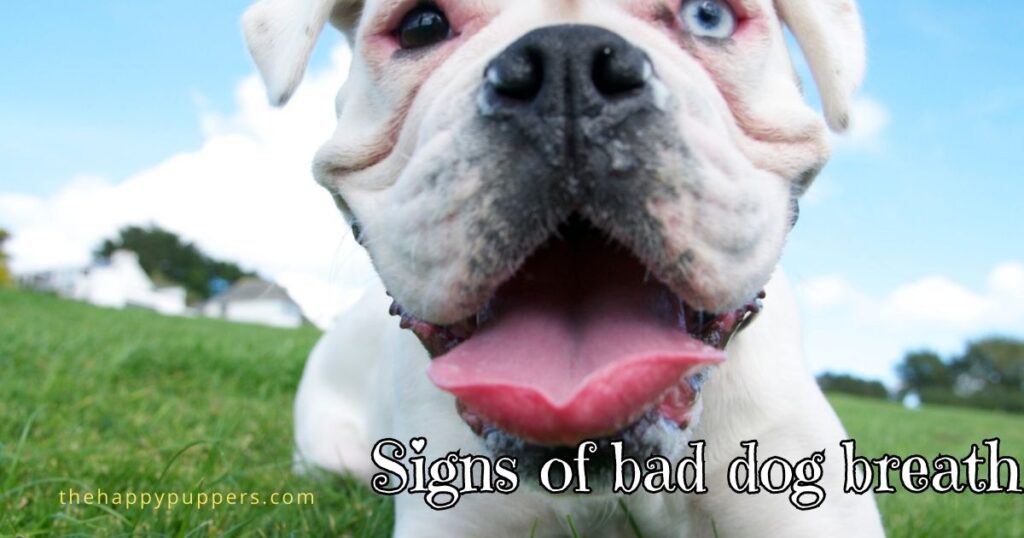
Reluctance to chew or eat
If your dog is facing dental issues, one way he may show this is by being reluctant towards eating. He may try to avoid food items that are hard and crunchy.
Changes in behavior
Chronic discomfort or pain can lead to major changes in the dog’s behavior. Your dog may show signs of being withdrawn, start behaving irritably, or completely avoid social interactions. These are signs of pain and discomfort and must not be ignored.
Swollen and red gums
Healthy gums in dogs look firm and pink. If you notice a discrepancy from the regular gum coloration; if the gum appears to be red, swelling or bleeding, it might be the cause of bad breath in dogs.
Presence of oral disease
Check for dog regularly for any sign or indication of oral diseases. These can be lumps, sores, ulcers or growth. These can be potentially life-threatening in the long run. Thus, do not ignore the signs and get your dog checked by the vet as soon as possible.
What would happen if bad breath is allowed to persist?
Unfortunately, most dog guardians do not pay much attention to the oral health of their dogs even after they become aware of the problem of bad breath in dogs. Here are some consequences that may occur as a result of ignoring the problem
Dental disease
As I mentioned before, bad breath is most often the result of some underlying health issue. In the case of the oral cavity, these issues might be gingivitis and periodontal disease. In case these conditions are not promptly treated, they can cause gum inflammation, tooth loss, decay, and even bone damage.
Discomfort and pain
Dogs cannot express their problems verbally like humans. Thus as a dog guardian, you have to constantly pay attention to even the slightest changes in the persona of the dog. He may experience difficulty in opening his mouth, eating, or chewing. The consequence of such a situation is reduced nutritional content, appetite, loss of weight, etc.
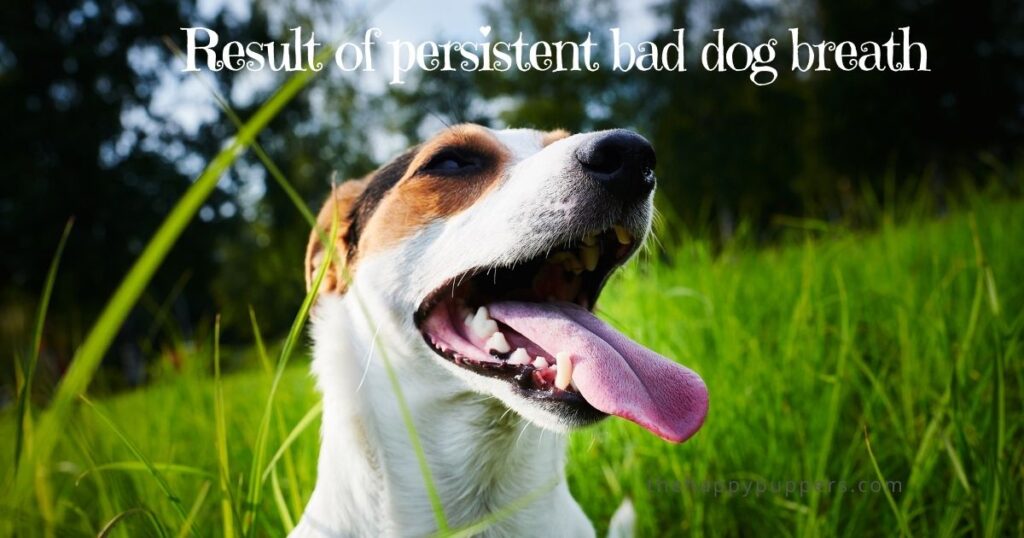
Systemic health problems
Improper oral hygiene can also lead to problems in other areas of the body of the dog. The bacteria from the infection of the mouth can spread to the other organs. This can lead to systemic issues in the body of the dog. From the mouth, the bacteria may go to liver, kidney , lungs and cause secondary issues that may potentially be fatal.
Infections and inflammation
Bad breath is a sign of gum infections, oral infections, or abscesses in the mouth. Infection in the mouth can cause severe inflammation that eventually affects the quality of your dog’s life.
If proper and timely treatment is not administered, the condition may worsen and the infection may spread to the other section of the dog’s body as I have mentioned before.
Compromization of the immune system
If your dog is facing a chronic oral infection, it can weaken the immune system of the dog. This will make your dog further susceptible to other infections and illnesses. The body’s ability to fight off simple infections may also be hampered, compromising the dog’s overall health.
Reduction in life quality
Difficulty in eating, swallowing, and chewing will cause your dog to eat less. This will compromise his quality of life. Your dog may stop engaging in his regular behavior due to the constant pain as well.
Expensive vet visits
Ignoring your dog’s oral health will cause secondary infections to occur. This will lead you to pay regular visits to the vet. Your dog may require dental cleaning to be done under anesthesia, tooth extraction, or even dental surgery. This will further add to your bills.
Treating bad breath in dogs
Now that I have discussed the causes and circumstances of untreated bad breath in dogs, let’s shed some light on how to keep your dog’s oral health maintained and get rid of the problem.
In the case of plaque and tartar
If the cause of the bad breath is tartar, plaque or periodontal disease, then you should schedule a vet visit and find out if your dog can undergo dental cleaning. Your vet will first conduct a blood work assessment to find out if your dog can be put under anesthesia. This vet appointment is also a good chance to find out if there are any other causes behind bad breath in your dog. During the cleaning process, the vet may extract damaged/loose teeth.
At home
At home, you must make sure that your dog cannot get into the dustbin. For this keep items like litter boxes and trash cans out of reach of your dog. The litter box can be kept high while the trash can be kept at a place where the dog is not allowed to go.
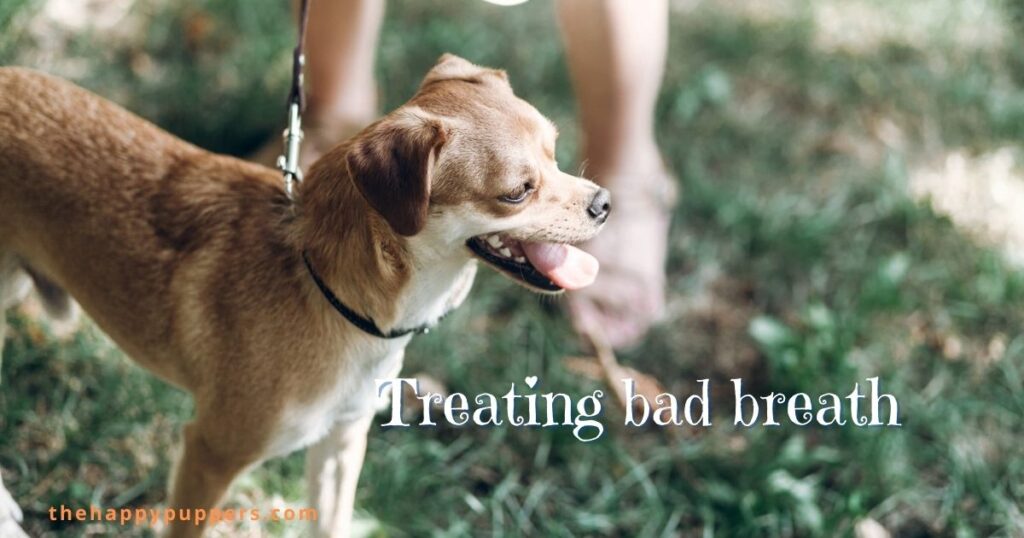
Medical Conditions
If the cause of the bad breath is an underlying medical condition, then the moment the underlying condition is treated, the problem of bad breath will also reduce.
Check your dog’s diet
The next aspect you should focus on is the diet of your dog. If your dog is on a balanced diet, the chances of having bad breath because of nutritional deficiency reduce. A proper and well-balanced diet can reduce the imbalance in the gut microbiome of your pup.
Ensure that your dog’s diet has all the essential nutrients it needs. Studies have shown that if a dog is deficient in vitamins B2, A, B3, B5, and B9, he may develop gum issues. Thus, make sure to supplement the diet of your dog with liver, fish, banana, and multivitamins depending on what your pup needs.
Provide kibble in the diet to eliminate bad breath in dogs
Kibble or dry dog food is hard to swallow. Thus this requires your dog to properly chew it before swallowing. Kibbles are also good at reducing tartars and plaque from the dog’s teeth. If your dog is on homemade dog food, consider adding a bit of kibble for tartar and plaque removal.
Boost healthy oral microbiome
The easiest way to promote a healthy oral microbiome is to provide your dog probiotics in the diet. Probiotics contain millions of bacteria that are good for your dog’s oral health. you can add the probiotic to either the food or water bowl of your dog.
Prevention of bad breath in dogs
The best option to prevent bad breath in dogs is to regularly brush his teeth. You can either use a human toothbrush or a dog toothbrush for brushing. Never use human toothpaste for your dogs. Dog toothpaste is specially formulated because dogs cannot spit it out. Regular teeth brushing reduces plaque formation, promotes hygiene, and keeps your dog’s oral cavity healthy.
Chew toys & hard treats can remove bad breath in dogs
Some chew toys and dog treats are especially focused on removing the tartar from the mouth of your dog. Chewing keeps the plaque and tartar from building up and also relieves boredom. However, remember to go for age and breed-appropriate toys when you select toys for your dog.
Extra care in case of smaller breeds
Langer breeds have bigger jaws and their teeth are spaced out. This reduces the chances of plaque and tartar build-up. However, if your dog belongs to a small breed, he will have less space between the teeth. This increases the chances of tartan and plaque build up in the dog’s mouth. Then, in case you have a small breed dog, provide him with many chew toys and regularly brush their teeth.
Regular veterinary checkups
A timely vet check-up with allow the vet to identify if your dog is developing any signs of periodontal infection. If your dog is at an early stage of the same, the vet can take of it. A complete professional dental checkup will keep any dental issues away.
Maintain proper hydration to monitor bad breath in dogs
As a dog guardian, you must ensure that your dog has access to clean water for drinking. Proper and adequate levels of hydration promote the production of saliva which helps to clean up the oral cavity and reduces the risk of bad breath in dogs.
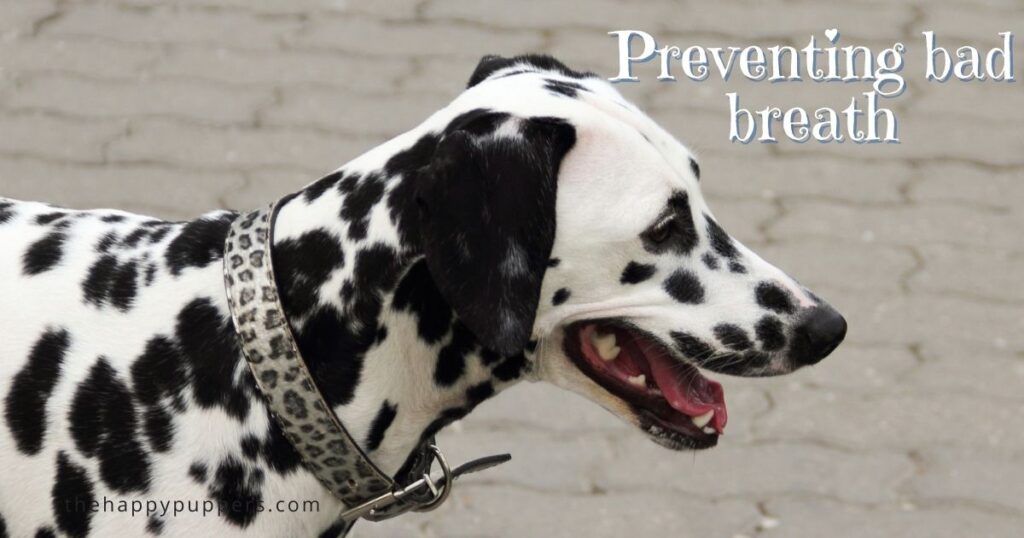
Regularly monitor dental health
Check your dog’s oral cavity regularly to find out any signs of dental issues. Check the mouth for signs of swelling, redness, abnormalities, and build-up of any kind. In case you notice any reason for concern, get it checked by a vet immediately.
Conclusion
Dogs put everything in their mouth. Needless to say, they require and deserve proper dental care. Dental issues do not stay restricted to the mouth. They have a way of making their way to other parts of the dog’s body and causing secondary infections. Thus, oral hygiene is of utmost importance and must not be ignored.
Introduce your dog to oral care very gradually. Consistency and patience are the two key things you should rely on. Your dog will get used to the oral care process with time and you will thank yourself when you are able to save a ton of vet bills in the future.
If you wish to know more about dog care, psychology, and training, subscribe to The Happy Puppers. If you like watching videos, subscribe to the YouTube channel of The Happy Puppers, Shruti and Delta. Remember to ring the notification bell so that YouTube notifies you the moment the next video releases.
In case you have queries about this blog post or any others on The Happy Puppers, leave them in the comment section below. I will be happy to answer them as soon as possible.
See you in my next blog post
Dr. Shruti.
FAQ’s bad breath in dogs
How can I get rid of my dog’s bad breath?
The easiest and quickest way to rid your dog of bad breath is to start brushing his teeth regularly. Regular teeth brushing reduces plaque formation and also promotes oral hygiene in your perp. A few weeks of training will have your dog enjoying teeth brushing time.
Why does my dog’s breath smell bad?
There are many causes behind bad dog breath. Some of the primary causes behind stinky breath in dogs is tooth decay and gum diseases. Irrespective of the cause, food debris and bacteria build up in your pup’s mouth can lead to formation of plaque in the teeth leading to an awful breath.
Why does my dog have bad breath and keep licking?
If you notice that your dog has stinky breath or is showing a difference in eating habits, you should take him to’ the vet for a proper dental check-up. The presence of foreign objects or oral lesions in the mouth may lead to excessive licking as well.
What foods cause lead breath in dogs?
The most common reason behind having bad dog breath is the last meal they consumed. If your dog is on tinned or canned food, there is a higher chance of foul odor compared to if he consumes fresh homemade food.

